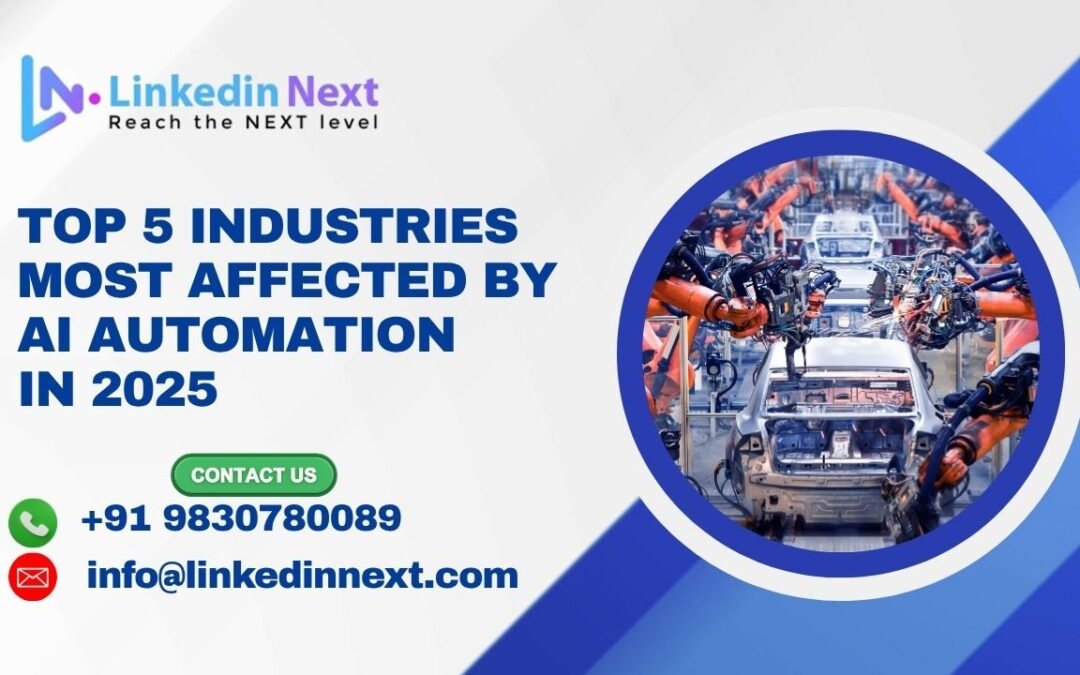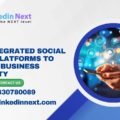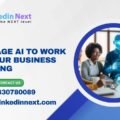Top 5 Industries Most Affected by AI Automation in 2025
Top 5 Industries Most Affected by AI Automation in 2025. The year 2025 has become a landmark moment in the global economy, as Artificial Intelligence (AI) automation continues to reshape industries across the world. From manufacturing lines to corporate offices, AI-driven technologies are redefining how we work, produce, and innovate. As automation takes hold, certain sectors have experienced particularly dramatic changes — both in terms of opportunity and disruption.
In this article, we explore the Top 5 industries most affected by AI automation in 2025, analyzing how each has evolved under the influence of intelligent machines and algorithms.
1. Manufacturing: The Era of Smart Factories
Automation at Full Scale
Manufacturing has been at the forefront of AI automation for years, but by 2025, the shift has accelerated into a full-blown revolution. Traditional assembly lines are now managed by AI-powered robotics, capable of executing complex tasks with precision and speed far beyond human capacity.
Smart factories utilize predictive analytics, machine vision systems, and automated quality control to ensure near-perfect production efficiency. Maintenance teams now rely on AI-driven predictive maintenance systems that prevent equipment breakdowns before they happen.
Impact on the Workforce
While repetitive manual jobs have declined, new roles have emerged for robotics engineers, AI technicians, and automation analysts. The demand for upskilling in mechatronics and AI integration has surged, as workers adapt to the evolving industrial ecosystem.
Key takeaway: The manufacturing industry has transitioned from human-dependent labor to AI-optimized production systems, marking one of the most profound transformations in the modern economy.
2. Transportation and Logistics: The Road to Autonomy
Self-Driving Revolution
In 2025, the transportation industry is dominated by autonomous vehicles, drones, and intelligent logistics systems. Self-driving trucks, powered by AI algorithms, are optimizing long-haul delivery routes and reducing fuel consumption. Meanwhile, AI-enabled traffic management systems are minimizing congestion and accidents in urban centers.
AI in Supply Chain Management
AI automation is also streamlining global supply chains. From automated warehousing and inventory prediction to real-time shipment tracking, companies are reducing delays and operational costs. Autonomous drones and robotic pickers are redefining warehouse management, particularly for e-commerce giants.
Workforce Impact
Traditional driving jobs are declining, while new opportunities arise in autonomous vehicle supervision, AI system maintenance, and logistics data analysis. Governments and corporations are now investing heavily in reskilling programs to help workers transition into these advanced roles.
Key takeaway: Transportation and logistics are becoming fully autonomous, creating safer, faster, and more efficient global mobility networks — but requiring massive workforce adaptation.
3. Healthcare: The AI-Powered Medical Frontier
Smarter Diagnostics and Treatment
AI has become a cornerstone of modern healthcare, revolutionizing how diseases are detected, diagnosed, and treated. In 2025, AI diagnostic systems can analyze medical images, genetic data, and patient histories faster and more accurately than human doctors. Predictive healthcare analytics help forecast potential outbreaks and prevent illnesses before symptoms appear.
Automation in Medical Administration
Hospitals and clinics are leveraging AI to handle administrative tasks, such as patient scheduling, billing, and electronic record management. Chatbots and virtual assistants guide patients through medical inquiries, freeing up human staff for more complex cases.
Ethics and Employment
While some administrative roles have diminished, new positions in AI-driven medical research, bioinformatics, and digital health management have grown rapidly. Ethical oversight roles — such as AI compliance officers — are also expanding, ensuring responsible and transparent technology usage.
Key takeaway: AI has elevated healthcare efficiency and accuracy, but the industry now demands a hybrid workforce skilled in both medical science and artificial intelligence.
4. Finance and Banking: The Rise of Algorithmic Intelligence
AI in Decision-Making
The finance sector has undergone a radical shift with the rise of AI-driven automation. In 2025, algorithms handle fraud detection, loan approvals, and investment forecasting with unprecedented accuracy. Robo-advisors now manage millions of investment portfolios using data-driven insights and real-time analytics.
Risk and Compliance Automation
Financial institutions rely on AI to manage regulatory compliance, identify suspicious transactions, and conduct credit risk assessments. This reduces human error while improving transparency and speed.
Changing Job Roles
Routine banking jobs like data processing and customer verification are rapidly disappearing. However, there’s a surge in demand for AI model auditors, cybersecurity specialists, and quantitative data scientists who build and monitor financial algorithms.
Key takeaway: The finance industry has embraced AI-powered intelligence to enhance precision and profitability — replacing manual roles with high-tech analytical positions.
5. Retail and E-Commerce: Hyper-Personalization Through AI
Smart Customer Engagement
Retail and e-commerce are among the most visible beneficiaries of AI automation. In 2025, AI systems analyze consumer behavior in real time, tailoring shopping experiences to each individual. From predictive product recommendations to AI chatbots handling 24/7 support, customer interactions are now instant, intelligent, and deeply personalized.
Automated Operations
AI streamlines logistics, inventory management, and supply chain forecasting. Automated pricing algorithms adjust costs dynamically based on market demand and competitor data. Meanwhile, AI visual search tools and virtual fitting rooms enhance online shopping convenience.
Job Evolution
Retail jobs have shifted from physical store management to digital operations, AI marketing strategy, and data-driven consumer analytics. Retailers now require professionals skilled in AI model training, customer data ethics, and predictive sales modeling.
Key takeaway: Retail has evolved into a data-driven ecosystem powered by AI, redefining consumer engagement and operational efficiency.
Final Thoughts: The AI-Driven Future of Work
As AI automation continues to advance, 2025 marks the turning point for global industries. While millions of routine jobs are being automated, equally significant opportunities are emerging in AI development, maintenance, and ethical governance. The workforce of tomorrow will thrive not by resisting AI — but by learning to collaborate with it.
In the coming years, adaptability, continuous learning, and digital literacy will become the most valuable professional assets. The industries that embrace these changes will not only survive — they will lead the AI revolution.
Also read our more BLOG here.
Thank you for read our blog “Top 5 Industries Most Affected by AI Automation in 2025”.
I hope this blog is helpful to you, if you have any question feel free contact us at
Call/WhatsApp: +91.9830780089 || Email: info@linkedinnext.com







Recent Comments